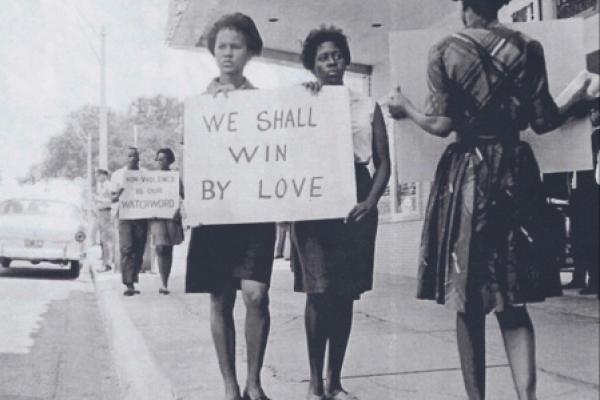"We do not see things as they are. We see things as we are.” This Talmudic quote from Rabbi Shemuel ben Nachmani notes that seeing is not always vision. What we see in life is more than what the eye beholds. A person or circumstances right in front of us can be merely the surface of someone or something more profound.
The United States must forever recall the struggles, moves, and marching of the women and men across the Edmund Pettus Bridge. Fifty years ago, ordinary people walked for the right to stand up and be counted. To the naked eye, those sojourners lacked political clout as much as they did fiscal wherewithal. Those citizens were not persons of means, but their intentions were good. They meant well. They meant to do whatever — to get the right to vote.
No whips, dogs, horses, or hoses would stifle their efforts. The Americans who marched from Selma to Montgomery may not have looked like much, but their actions changed this country’s political horizon and racial landscape. Yes, a yearning in their loins propelled them to create social change. They were going to vote at any cost, at any price.
In this week’s lectionary passage, a man crippled from birth wanted “change.” Actually, he wanted coins or any alms that Peter and John could offer (Acts 3:1-11). To this man, the two disciples were in better shape than he was. From his view, he could surely benefit from whatever they had to offer. Yet, Peter exposes their impecunious state: “Look on us. We don’t have a nickel to our names.”
There was nothing spectacular or dazzling about Peter or John. They were common, first century fishermen turned disciples. Their lot was that of trying to communicate the kingdom message of a crucified and resurrected Messiah. No bling. No gold. Nothing platinum about them. Nonetheless, what they gave to a man lame from the womb was beyond value or measure.
The duo could not give dollars or cents. Yet, through an act of mercy, they provided more than money could buy. Peter pulls the man by his right hand, stands him up, and the man’s limbs enable him to walk, even jump. This man who sought a fiscal handout was now the recipient of a physical healing. The desire for one type of “change” led to different degree of transformation.
In their human packaging, Peter and John demonstrated there was more to them than the eye could see. There is a simplicity of presence that cannot shroud depth of ability. The man at the Gate Beautiful witnessed it. Those marching over the waters of the Alabama River in 1965 affirmed it. The late Dr. Gardner Taylor embodied it.
The one deemed, “Dean of Preachers,” Rev. Dr. Gardner Calvin Taylor , passed away on Easter Sunday. While Christians across the globe turned their attention to an empty tomb, Dr. Taylor left this world to occupy an empty seat at the Welcome Table. In the middle of this year’s Passover celebration, the Divine sent death angels to escort this venerable homiletician to his eternal resting place.
There is a stark irony to it all. Dr. Taylor was not one who ascribed to such grandeur. As Dr. H. Beecher Hicks, Jr. notes: “His gift was in simplicity… Typically no manuscript, no scribbled notes -- his sermonic offerings had been written on the tablet of his heart, left open and pure for all the world to see.” From Louisiana’s bayou to preaching at the 1993 Inauguration Worship Service for President Clinton, Dr. Taylor without much fanfare taught us not to become enamored with appearances.
While most will connect Dr. Taylor to pulpitry, his political voice was just as herculean. His creative efforts helped to spearhead the organizing of the Progressive National Baptist Convention in 1961. This religious body gave Dr. Martin Luther King, Jr. a platform and the human capital needed to march until “justice rolled down like water and righteousness like an ever-flowing stream.” What for many seemed to be another preachers’ group became a national think-tank for the Civil Rights Movement. Thus, one can easily surmise why those answering King’s clarion call to assemble in Selma included so many of the cloth.
Some things are more than the human eye can see.
The ministry of a preacher birthed in Baker, Louisiana, would halt other clergy in their prophetic tracks and give rise to a powerful, progressive, political machine. With the help of two undistinguished disciples, the man in Acts was able to stand and walk. The actions of working class citizens converging in Selma forced the nation to stand still and watch while images of police brutality catapulted across television screens.
All three scenarios remind America that we must continue to protest until all are able to stand, to vote, and to be counted. We march on no matter how much the Supreme Court attempts to disembowel the Voting Rights Act. Race-related, political-agitating conferences, such as Chicago Theological Seminary’s Selma At 50, must not go silent. We protest as long as there are still Walter Scott moments in the world.
Because while it may appear that we are in post-racial world, there is more to this than the human eye can see. There is more to us than the human eye can see.
Rev. Dr. Stephanie Buckhanon Crowder , an ordained Baptist and Disciples of Christ minister, teaches New Testament at Belmont University. Via ON Scripture.
Got something to say about what you're reading? We value your feedback!
